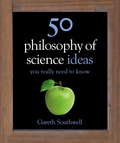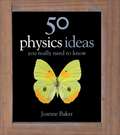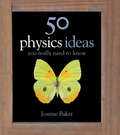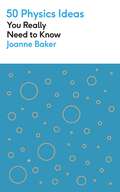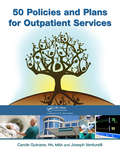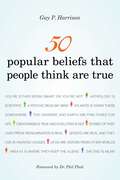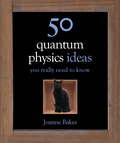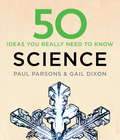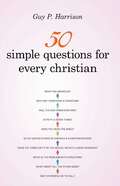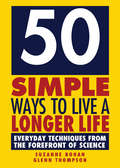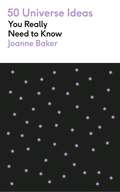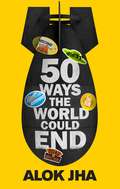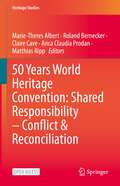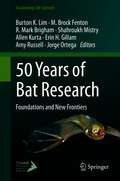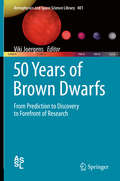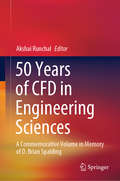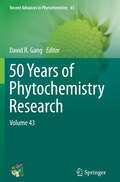- Table View
- List View
50 Philosophy of Science Ideas You Really Need to Know (50 Ideas You Really Need To Know Ser.)
by Gareth SouthwellScience first began as a branch of philosophy, but it has since grown up and moved out of the family home, and its successes have put its parent in the shade. Thanks to scientific knowledge we have walked on the Moon, cured once-fatal illnesses, and even identified the very building blocks of life and the universe. But it is these very successes that underline the need for philosophy. How much should we trust the pronouncements of scientists that we read in the media? What are the ethical implications of our delving into the foundations of our DNA, reproductive treatments, or artificially prolonging life? And are there limits to what science can tell us about the world we think we know? In straightforward and accessible terms, 50 Philosophy of Science Ideas You Really Need to Know explains the key philosophical questions that continue to lie at the heart of the nature and practice of science today. The ideas explored include: Appearance and reality; Knowledge; Anti-realism; Metaphysics; Science and gender; Phenomenology and science.
50 Philosophy of Science Ideas You Really Need to Know (50 Ideas You Really Need to Know series)
by Gareth SouthwellScience first began as a branch of philosophy, but it has since grown up and moved out of the family home, and its successes have put its parent in the shade. Thanks to scientific knowledge we have walked on the Moon, cured once-fatal illnesses, and even identified the very building blocks of life and the universe. But it is these very successes that underline the need for philosophy. How much should we trust the pronouncements of scientists that we read in the media? What are the ethical implications of our delving into the foundations of our DNA, reproductive treatments, or artificially prolonging life? And are there limits to what science can tell us about the world we think we know? In straightforward and accessible terms, 50 Philosophy of Science Ideas You Really Need to Know explains the key philosophical questions that continue to lie at the heart of the nature and practice of science today. The ideas explored include: Appearance and reality; Knowledge; Anti-realism; Metaphysics; Science and gender; Phenomenology and science.
50 Physics Ideas You Really Need to Know
by Joanne BakerIn this, the second volume in an important new series presenting core concepts across a range of critical areas of human knowledge, author Joanne Baker unravels the complexities of 20th-century scientific theory for a general readership. From Hubble's law to the Pauli exclusion principle, and from Schrödinger's cat to Heisenberg's uncertainty principle, she explains ideas at the cutting-edge of scientific enquiry, making them comprehensible and accessible to the layperson.
50 Physics Ideas You Really Need to Know
by Joanne BakerWe encounter physics before we've even left the house in the morning; an alarm clock tracks time, a mirror reflects light waves and our mobile phones rely on satellites held in their orbit by gravity. Where would we be without the Bernoulli equation to explain how planes fly, electromagnetic waves enabling us to communicate around the world or the discovery of X-rays? In 50 Physics Ideas You Really Need to Know Joanne Baker will uncover the physics all around us, from basic concepts like gravity, light and energy through to the complexities of quantum theory, chaos and dark energy. Featuring short biographies of iconic physicists, explanatory diagrams and timelines showing discoveries within their historical context, this book is the perfect guide to the fundamental concepts of physics, making even the most challenging theories easy to understand. Contents include: Newton's law of gravitation, Brownian motion, Chaos theory, Fleming's right hand rule, Planck's law, Heisenberg's uncertainty principle, Schrodinger's cat, Superconductivity, Rutherford's atom, Nuclear fission and fusion, The God particle, String theory, Special and general relativity, The big bang and the Anthropic principle.
50 Physics Ideas You Really Need to Know (50 Ideas You Really Need to Know series)
by Joanne BakerWe encounter physics before we've even left the house in the morning; an alarm clock tracks time, a mirror reflects light waves and our mobile phones rely on satellites held in their orbit by gravity. Where would we be without the Bernoulli equation to explain how planes fly, electromagnetic waves enabling us to communicate around the world or the discovery of X-rays? In 50 Physics Ideas You Really Need to Know Joanne Baker will uncover the physics all around us, from basic concepts like gravity, light and energy through to the complexities of quantum theory, chaos and dark energy. Featuring short biographies of iconic physicists, explanatory diagrams and timelines showing discoveries within their historical context, this book is the perfect guide to the fundamental concepts of physics, making even the most challenging theories easy to understand. Contents include: Newton's law of gravitation, Brownian motion, Chaos theory, Fleming's right hand rule, Planck's law, Heisenberg's uncertainty principle, Schrodinger's cat, Superconductivity, Rutherford's atom, Nuclear fission and fusion, The God particle, String theory, Special and general relativity, The big bang and the Anthropic principle.
50 Physics Ideas You Really Need to Know (50 Ideas You Really Need to Know series)
by Joanne BakerIn a series of 50 accessible essays, Joanne Baker introduces and explains the fundamental physical concepts and laws that govern the inners workings of our universe.From Newton's law of gravitation to black holes, Schrödinger's cat to chaos theory, 50 Physics Ideas You Really Need to Know is a complete introduction to the most important physics concepts in history.
50 Physics Ideas You Really Need to Know (50 Ideas You Really Need to Know series)
by Joanne BakerIn a series of 50 accessible essays, Joanne Baker introduces and explains the fundamental physical concepts and laws that govern the inners workings of our universe.From Newton's law of gravitation to black holes, Schrödinger's cat to chaos theory, 50 Physics Ideas You Really Need to Know is a complete introduction to the most important physics concepts in history.
50 Policies and Plans for Outpatient Services
by Carole Guinane Joseph VenturelliSince more and more surgeries and procedures are being performed in outpatient settings, the policies, plans, and procedures for these services are of increasing importance. 50 Policies and Plans for Outpatient Services details commonly used policies and plans in free-standing ambulatory care centers. Included are plans and policies concentrating on emergency management, medication safety, informed consent, and medical staff credentialing to name a few.As an introduction to the model documents presented, the book begins with a how-to chapter to guide readers through the process of formatting the documents and making them their own. The policies and plans discussed serve as templates and can apply to licensing and regulatory agencies such as Medicare, the Joint Commission, and AAAHC. The documents included in this book are excellent templates to use as a starting point for producing policies and plans that help create the flow and process in an organization. Knowing their specific local, state, and other governing agency requirements, readers can customize the documents to reflect the unique structure and qualities of their organization through the use of the downloadable resources. The resulting policies, procedures, and plans are the back-up documents that provide rationale, vision, and theory, and can be valuable tools for making effective clinical and administrative decisions. In addition to the documents provided on the downloadable resources, the book also includes a list of helpful resources.
50 Popular Beliefs That People Think Are True
by Guy P. Harrison"What would it take to create a world in which fantasy is not confused for fact and public policy is based on objective reality?" asks Neil deGrasse Tyson, science popularizer and author ofAstrophysics for People in a Hurry."I don't know for sure. Buta good place to start would be for everyone on earth to read this book." Maybe you know someone who swears by the reliability of psychics or who is in regular contact with angels. Or perhaps you're trying to find a nice way of dissuading someone from wasting money on a homeopathy cure. Or you met someone at a party who insisted the Holocaust never happened or that no one ever walked on the moon. How do you find a gently persuasive way of steering people away from unfounded beliefs, bogus cures, conspiracy theories, and the like? This down-to-earth, entertaining exploration of commonly held extraordinary claims will help you set the record straight. The author, a veteran journalist, has not only surveyed a vast body of literature, but has also interviewed leading scientists, explored "the most haunted house in America," frolicked in the inviting waters of the Bermuda Triangle, and even talked to a "contrite Roswell alien." He is not out simply to debunk unfounded beliefs. Wherever possible, he presents alternative scientific explanations, which in most cases are even more fascinating than the wildest speculation. For example, stories about UFOs and alien abductions lack good evidence, but science gives us plenty of reasons to keep exploring outer space for evidence that life exists elsewhere in the vast universe. The proof for Bigfoot or the Loch Ness Monster may be nonexistent, but scientists are regularly discovering new species, some of which are truly stranger than fiction. Stressing the excitement of scientific discovery and the legitimate mysteries and wonder inherent in reality, this book invites readers to share the joys of rational thinking and the skeptical approach to evaluating our extraordinary world.
50 Quantum Physics Ideas You Really Need to Know (50 Ideas You Really Need to Know series)
by Joanne BakerA guide to everything you need and want to know about quantum physics, how our universe works and our existence in it. Quantum physics is the most cutting-edge, important and fascinating area of modern science. We have all heard of Einstein's theory of relativity and Schrodinger's Cat - but do we really understand the mind-bending theories of our universe?In 50 concise chapters, Joanne Baker covers the foundation concepts of quantum physics and moves on to present clear explanations of complex theories and their advanced applications - from string theory to black holes, and quarks to quantum computing. With informative two-colour illustrations alongside key ideas in straightforward, bite-sized chunks, this book will teach you everything you need to know about quantum physics - and challenge the way you understand the world. The ideas explored include: Theory of relativity; Schrödinger's cat; Nuclear forces: fission and fusion; Antimatter; Superconductivity.
50 Quantum Physics Ideas You Really Need to Know (50 Ideas You Really Need to Know series)
by Joanne BakerA guide to everything you need and want to know about quantum physics, how our universe works and our existence in it. Quantum physics is the most cutting-edge, important and fascinating area of modern science. We have all heard of Einstein's theory of relativity and Schrodinger's Cat - but do we really understand the mind-bending theories of our universe?In 50 concise chapters, Joanne Baker covers the foundation concepts of quantum physics and moves on to present clear explanations of complex theories and their advanced applications - from string theory to black holes, and quarks to quantum computing. With informative two-colour illustrations alongside key ideas in straightforward, bite-sized chunks, this book will teach you everything you need to know about quantum physics - and challenge the way you understand the world. The ideas explored include: Theory of relativity; Schrödinger's cat; Nuclear forces: fission and fusion; Antimatter; Superconductivity.
50 Quantum Physics Ideas You Really Need to Know (50 Ideas You Really Need to Know series)
by Joanne BakerIn a series of 50 accessible essays, Joanne Baker introduces and explains the fundamental physical concepts and laws that govern the inner workings of our universe.From Schrodinger's cat to Einstein's theory of relativity, energy conservation to speed of light, 50 Quantum Physics Ideas You Really Need to Know is a complete introduction to the most important quantum physics concepts in history.
50 Quantum Physics Ideas You Really Need to Know (50 Ideas You Really Need to Know series)
by Joanne BakerIn a series of 50 accessible essays, Joanne Baker introduces and explains the fundamental physical concepts and laws that govern the inner workings of our universe.From Schrodinger's cat to Einstein's theory of relativity, energy conservation to speed of light, 50 Quantum Physics Ideas You Really Need to Know is a complete introduction to the most important quantum physics concepts in history.
50 Science Ideas You Really Need to Know
by Paul Parsons Gail Dixon50 Science Ideas You Really Need to Know is your guide to the biggest questions and deepest concepts from across the whole of science. What was the Big Bang? How did life on Earth arise? What does quantum mechanics tell us about the universe? Is true artificial intelligence possible? And does life exist on other planets? Moving from the basics of atoms and molecules, Newton's laws of physics and the building blocks of life to the cutting edge of nanotechnology, Einstein's theories of relativity and cloning, this book makes the many worlds of science accessible and illuminating. Featuring fifty concise, insightful and illustrated essays covering physics and astronomy, Earth and life sciences, chemistry and materials, psychology and computing, and exploring the ways they connect with each other and impact on our lives, 50 Science Ideas You Really Need to Know is the ideal introduction to the questions which fascinate us all.
50 Simple Questions for Every Christian
by Guy P. HarrisonWritten in a respectful and conversational style, this unique book is designed to promote constructive dialogue and foster mutual understanding between Christians and non-Christians. The author, a skeptic and journalist, asks basic questions about Christian belief. What is the born-again experience? Why would God want to sacrifice his only son for the world? Do miracles really happen? How reliable is the Bible? What is the rapture? Why isn't everyone a Christian? Each question is followed by commentary and analysis that is skeptical and tough but never argumentative or condescending. Christians will find the book useful as a basis for developing their apologetics, while skeptics will welcome Harrison's probing rational analysis of religious claims.
50 Simple Ways to Live a Longer Life
by Suzanne Bohan Glenn ThompsonIn 2011, the first wave of the 76 million Baby Boomers will reach age 65, and one in three American adults will be senior citizens. Everyone wants to know how to live the healthiest and longest life. 50 Simple Ways to Live a Longer Life is an easy-to-comprehend resource packed with the most amazing health discoveries from the forefront of science. It leaves readers inspired to take active roles in extending their own lives and improving their own health. Each chapter contains a different way to extend your life, plus a "Making It Real" section that tells readers what they specifically can do to achieve these benefits. 50 Simple Ways to Live a Longer Life offers fresh perspectives and intriguing information, even on those frequently covered topics like exercise and diet. This book is an affordable, easy-to-assimilate book that will help people add years and vigor to their life.
50 Universe Ideas You Really Need to Know (50 Ideas You Really Need to Know series)
by Joanne BakerIn a series of 50 accessible essays, Jo Baker introduces and explains all of the essential concepts, major discoveries and the very latest thinking in astrophysics.From heliocentrism to Newton's theory of optics, the theory of relativity to supermassive black holes, 50 Ideas You Really Need to Know: Universe is a complete introduction to the most important concepts about our universe.
50 Universe Ideas You Really Need to Know (50 Ideas You Really Need to Know series)
by Joanne BakerIn a series of 50 accessible essays, Jo Baker introduces and explains all of the essential concepts, major discoveries and the very latest thinking in astrophysics.From heliocentrism to Newton's theory of optics, the theory of relativity to supermassive black holes, 50 Ideas You Really Need to Know: Universe is a complete introduction to the most important concepts about our universe.
50 Ways the World Could End: The Doomsday Handbook
by Alok JhaDeath by Euphoria. Dysgenics. Population Death Spiral. Genetic Superhumans. Geomagnetic Reversal. Galactic Collision. Strangelets. Whether we like it or not, everything's going to come to a pretty unpleasant halt on our planet at some point in the future. What we don't know is what form our extinction is likely to take. In this accessible and entertaining book, acclaimed writer Alok Jha explains the head-spinning apocalyptic science behind 50 horrifying doomsday scenarios.
50 Ways the World Could End: The Doomsday Handbook
by Alok JhaDeath by Euphoria. Dysgenics. Population Death Spiral. Genetic Superhumans. Geomagnetic Reversal. Galactic Collision. Strangelets. Whether we like it or not, everything's going to come to a pretty unpleasant halt on our planet at some point in the future. What we don't know is what form our extinction is likely to take. In this accessible and entertaining book, acclaimed writer Alok Jha explains the head-spinning apocalyptic science behind 50 horrifying doomsday scenarios.
50 Years World Heritage Convention: Shared Responsibility – Conflict & Reconciliation (Heritage Studies)
by Marie-Theres Albert Claire Cave Anca Claudia Prodan Matthias Ripp Roland BerneckerThis open access book identifies various forms of heritage destruction and analyses their causes. It proposes strategies for avoiding and solving conflicts, based on integrating heritage into the 2030 Agenda for Sustainable Development. It reflects on the identity-building role of heritage, on multidimensional conflicts and the destruction of heritage, and considers conflict-solving strategies and future perspectives. Furthermore, it engages theoretically and practically with the concepts of responsibility, reconciliation and sustainability, relating mainly to four Sustainable Development Goals, i.e. SDGs 4 (education), 11 (e.g. World Heritage), 13 (climate action) and 17 (partnerships for the goals). More than 160 countries have inscribed properties on the UNESCO World Heritage list since the World Heritage Convention came into force. Improvements in the implementation of the Convention, such as the Global Strategy for a Representative, Balanced and Credible World Heritage List, have occurred, but other conflicts have not been solved. The book advocates for a balanced distribution of properties and more effective strategies to represent the global diversity of cultural and natural heritage. Furthermore it highlights the importance of heritage in identity building.
50 Years of Bat Research: Foundations and New Frontiers (Fascinating Life Sciences)
by M. Brock Fenton Amy Russell Jorge Ortega Allen Kurta Burton K. Lim R. Mark Brigham Shahroukh Mistry Erin H. GillamWith more than 1,400 species, bats are an incredibly diverse and successful group of mammals that can serve as model systems for many unique evolutionary adaptations. Flight has allowed them to master the sky, while echolocation enables them to navigate in the dark. Being small, secretive, nocturnal creatures has made bats a challenge to study, but over the past 50 years, innovative research has made it possible to dispel some of the mystery and myth surrounding them to give us a better understanding of the role these animals play in the ecosystem. The structure of the book is based on several broad themes across the biological sciences, including the evolution of bats, their ecology and behavior, and conservation of biodiversity. Within these themes are more specific topics on important aspects of bat research, such as morphology, molecular biology, echolocation, taxonomy, systematics, threats to bats, social structure, reproduction, movements, and feeding strategies. Given its scope, the book will appeal to the wider scientific community, environmental organizations, and government policymakers who are interested in the interdisciplinary aspects of biology and nature.
50 Years of Brown Dwarfs: From Prediction to Discovery to Forefront of Research (Astrophysics and Space Science Library #401)
by Viki JoergensThe years 2012/2013 mark the 50th anniversary of the theoretical prediction that Brown Dwarfs, i. e. degenerate objects which are just not massive enough to sustain stable hydrogen fusion, exist. Some 20 years after their discovery, how Brown Dwarfs form is still one of the main open questions in the theory of star formation. In this volume, the pioneers of Brown Dwarf research review the history of the theoretical prediction and the subsequent discovery of Brown Dwarfs. After an introduction, written by Viki Joergens, reviewing Shiv Kumar's theoretical prediction of the existence of brown dwarfs, Takenori Nakano reviews his and Hayashi's calculation of the Hydrogen Burning Minimum Mass. Both predictions happened in the early 1960s. Jill Tarter then writes on the introduction of the term 'Brown Dwarf', before Ben Oppenheimer, Rafael Rebolo and Gibor Basri describe their first discovery of Brown Dwarfs in the 1990s. Lastly, Michael Cushing and Isabelle Baraffe describe the development of the field to the current state of the art. While the book is mainly aimed at the Brown Dwarf research community, the description of the pioneering period in a scientific field will attract general readers interested in astronomy as well.
50 Years of CFD in Engineering Sciences: A Commemorative Volume in Memory of D. Brian Spalding
by Akshai RunchalProf. D. Brian Spalding, working with a small group of students and colleagues at Imperial College, London in the mid-to late-1960’s, single-handedly pioneered the use of Computational Fluid Dynamics (CFD) for engineering practice.This book brings together advances in computational fluid dynamics in a collection of chapters authored by leading researchers, many of them students or associates of Prof. Spalding. The book intends to capture the key developments in specific fields of activity that have been transformed by application of CFD in the last 50 years. The focus is on review of the impact of CFD on these selected fields and of the novel applications that CFD has made possible. Some of the chapters trace the history of developments in a specific field and the role played by Spalding and his contributions. The volume also includes a biographical summary of Brian Spalding as a person and as a scientist, as well as tributes to Brian Spalding by those whose life was impacted by his innovations. This volume would be of special interest to researchers, practicing engineers, and graduate students in various fields, including aerospace, energy, power and propulsion, transportation, combustion, management of the environment, health and pharmaceutical sciences.
50 Years of Phytochemistry Research: Volume 43 (Recent Advances in Phytochemistry #43)
by David R GangThis 43rd volume of RAP includes a total of seven articles based on talks presented at the 50th Anniversary meeting of the PSNA, which was held at the Fairmont Orchid, in Waikoloa, Hawai'i, USA. These seven Perspectives give a very good picture of the breadth of plant (bio)chemistry research in North America, which is also indicative of the state of the field worldwide. Each of these articles describes the integration of several different approaches to ask and then answer interesting questions regarding the function of interesting plant metabolites, either in the plant itself or in interactions with the environment (natural setting or human health application). Two Perspectives outline very clearly the power of approaching biological questions from a modern, "omics" or systems biology approach. Beale and Ward outline how metabolomics approaches can be brought to bear on plant biosynthetic questions and quickly lead to important advances in our understanding or how plants produce important metabolites. Zandkarimi et al. outline the integration of ion mobility spectrometry into mass spectrometry-based metabolomics investigations and show clearly how powerful those two spectrometric technologies can be when used together.
